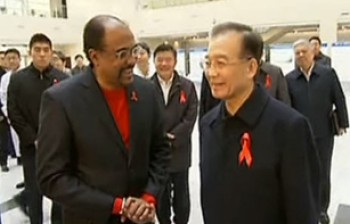UNAIDS applauds China’s decision to fill its HIV resource gap
UNAIDS applauds China’s decision to fill its HIV resource gap
China calls for shared responsibility in achieving zero new HIV infections, zero discrimination, zero AIDS-related deaths

BEIJING/GENEVA, 1 December 2011—China has pledged to fill its HIV resource gap by increasing domestic investments. This pledge was made China’s Premier H.E. Wen Jiabao at a World AIDS Day event in Beijing. The Premier also called on the international community to fully meet its commitments and achieve a world with zero new HIV infections, zero discrimination and zero AIDS-related deaths.
“I see no reason for the Global Fund to withdraw its support to China,” said Premier Wen Jiabao at the AIDS roundtable in Beijing. “I have asked the Minister of Finance to close the gap left by the Global Fund. We will rely on our own efforts.”
This new commitment from China comes at a crucial moment as resources for AIDS are declining and the Global Fund to Fight AIDS, Tuberculosis, and Malaria is facing a major setback in resource mobilization, leading to the cancellation of its next call for country proposals (Round 11), putting millions of lives at risk.
“China’s voice could not have come at a more critical time in the AIDS response. We are in a period of high risk and welcome this bold decision,” said Michel Sidibé, Executive Director of UNAIDS, when thanking the Premier of China. “I am confident that a new socially sustainable agenda can be forged that promotes country ownership and shared responsibility.”
More than 6.6 million people are on HIV treatment in low- and middle-income countries and rates of new HIV infections have fallen in most parts of the world. Domestic investments have steadily increased, but the magnitude of the epidemic in Africa means that continued international solidarity and investments are vital.
“Getting Round 11 back on track is a top priority especially as Africa is leading the world in reducing new HIV infections and AIDS-related deaths. Its international partners must come forward and help countries multiply their success,” said Mr Sidibé. “This call is not just about shared responsibility but also of shared values.”
China has scaled up its AIDS response in a short timespan, including its evidence-informed HIV prevention services. By rapidly scaling up access to drug substitution therapies, it has reduced new HIV infections among people using these services to close to zero. China has also made important advances in its anti-discrimination programmes and support for civil society organizations.
“To defeat AIDS, it will take the whole society,” said Premier Wen Jiabao. “China is willing to play its part.” China’s rapid scale up model can be replicated in other countries—especially in strengthening the capacity of community health workers to deliver HIV services. In addition, China can provide vital technology transfer in key areas of innovation of HIV treatment, including development of new antiretroviral medicines, investing in research and development, telecommunications, e-health infrastructure and supply chain management.
###
> United Nations (UN).
 The United Nations was established on 24 October 1945 by 51 countries committed to preserving peace through international cooperation and collective security. Today, nearly every nation in the world belongs to the UN: membership totals 192 countries.
The United Nations was established on 24 October 1945 by 51 countries committed to preserving peace through international cooperation and collective security. Today, nearly every nation in the world belongs to the UN: membership totals 192 countries.
When States become Members of the United Nations, they agree to accept the obligations of the UN Charter, an international treaty that sets out basic principles of international relations. According to the Charter, the UN has four purposes:
- to maintain international peace and security;
- to develop friendly relations among nations;
- to cooperate in solving international problems and in promoting respect for human rights;
- and to be a centre for harmonizing the actions of nations.
###
* The above story is adapted from materials provided by United Nations (UN)
** More information at United Nations (UN)


















